Have you received an email, seemingly from Geek Squad, claiming your protection plan will auto-renew at a high cost unless you cancel? You’re not alone. This email, purportedly from Geek Squad, is actually a phishing scam circulating online. It’s important to know how to recognize and avoid this and similar email scams.
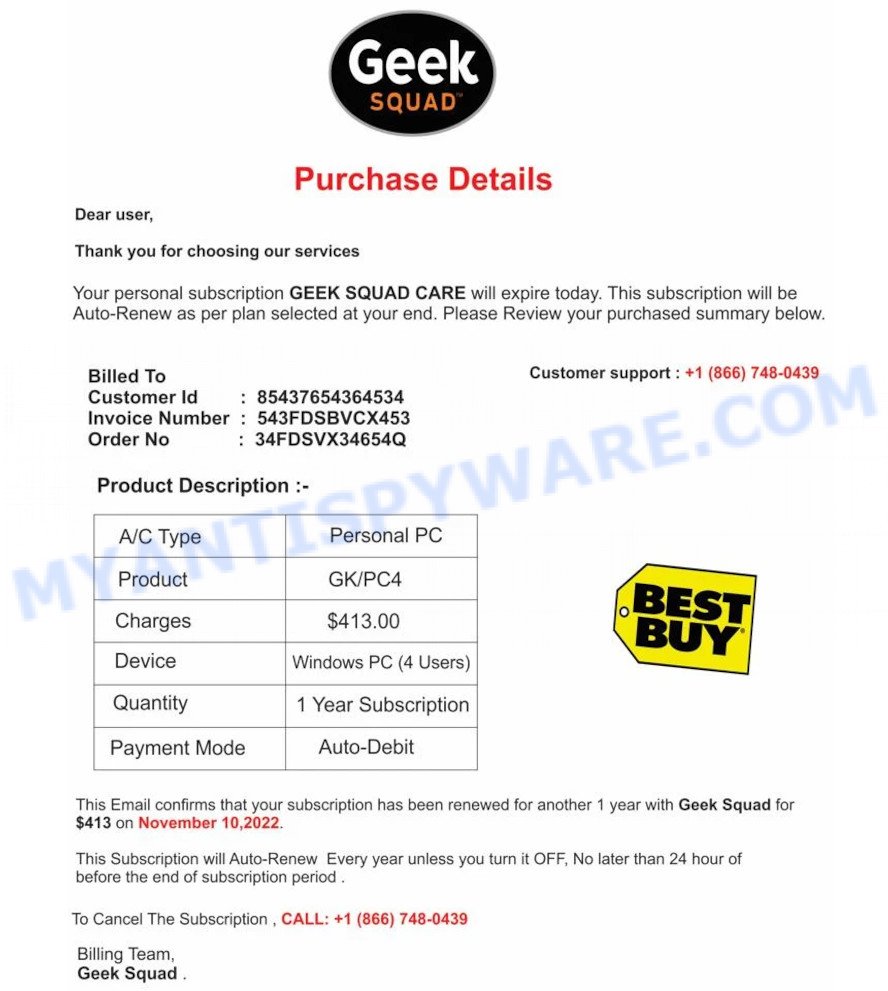
In this article, we’ll explain how this scam works, what signs to look for, and most importantly, steps you can take to protect yourself. By staying informed and vigilant, you can safeguard your personal and financial information.
Remember, if you ever receive an unexpected call or email regarding your subscriptions or payments, especially when prompted to provide personal information, take a moment to contact the company directly using verified contact details. Stay alert and protect your personal information from phishing scams like this.
Table of Contents
🚨 Is the Geek Squad Email Legit?
The Geek Squad Email Scam employs devious phishing tactics designed to trick unsuspecting computer users into revealing sensitive personal and financial information. Posing as representatives of Geek Squad and Best Buy, scammers send an email that mimics a genuine auto-renewal notification for a computer protection plan. The email creates a false sense of urgency by threatening an imminent and expensive charge if the subscription isn’t canceled immediately.
Below is an example of a typical Geek Squad Scam Email:
DATE: 01-10-2025
Dear Sir/Ma’am,Thank you for choosing Geek Squad for your computer protection plan. As today is the auto renewal date, you will be charged the amount of $399.99 for the Geek Squad Protection Plan. This charge will be directly debited from your bank checking account and should appear on your statement within the next 48 hours.
Account Type: – Personal Home Subscription
Product: – Geek Squad Protection Plan
Device: – Windows/Mac Computer (1 User)
Quantity: – 1Tenure: — 1 Year Subscription
Mode: — Auto Debit
Renewal Amount — $399.99Billed to:
Customer ID: DX64958MD
Renewal Date: Jan 10, 2023
Invoice Number: 192837460However, if you wish to cancel this subscription, please call our Helpline Number — +1 (888) 713-7163
Thanks and regards,
GEEK SQUAD RENEWAL TEAM
BEST BUYPlease do not reply to this email. This mailbox is unmonitored, and you will not receive a response.
Key Red Flags:
- 🌐 Official-Looking Email Templates: The scam email is crafted to resemble actual communications from Geek Squad, complete with fake logos, customer IDs, invoice numbers, and renewal dates. However, a closer look reveals discrepancies such as unfamiliar sender addresses and details inconsistent with official Best Buy contacts.
- ⭐ Urgent Renewal Threats: The email emphasizes that a costly auto-renewal—often accompanied by a clear deadline—is imminent. This high-pressure tactic is intended to bypass your rational verification process, pushing you toward immediate action.
- 🔒 Misleading Contact Information: Instead of providing verified Geek Squad support channels, the email lists a phone number that routes directly to the scammers. When victims call, they are manipulated into sharing personal details like their name, address, and bank account information.
- ⚠️ Fabricated Transaction Details: Scammers include false data such as a Customer ID, renewal invoice number, and even a purported service date to mimic an authentic transaction. These details are designed to instill false confidence, even though no real account is linked to them.
- 📉 Questionable Authenticity and Urgency: Despite the polished appearance, the overall format and embedded urgent language—combined with subtle errors and odd phrases—signal that the email is a carefully constructed phishing attempt rather than a genuine business communication.
In summary, the numerous red flags surrounding the Geek Squad Email Scam indicate that it is a fraudulent scheme aimed at deceiving individuals. By exploiting the reputation of well-known companies and employing urgency and fabricated details that mimic genuine customer communications, scammers intend to steal sensitive information from unsuspecting victims. Always verify the legitimacy of such emails through official company channels and avoid providing personal or financial details when in doubt. Protect yourself by remaining cautious and reporting any suspicious communications to the proper authorities.
🕵️♂️ How the Geek Squad Email Scam Operates
Scammers behind the Geek Squad Email Scam start by sending out highly convincing phishing emails that appear to come directly from Geek Squad’s Renewal Team at Best Buy. These emails warn unsuspecting customers that their computer protection plan is due for auto-renewal and that a significant fee will be charged soon if they don’t immediately cancel the subscription. The messages include real-looking details like customer IDs, renewal dates, invoice numbers, and even precise amounts—for example, “$399.99″—all designed to mimic authentic communications from Best Buy.
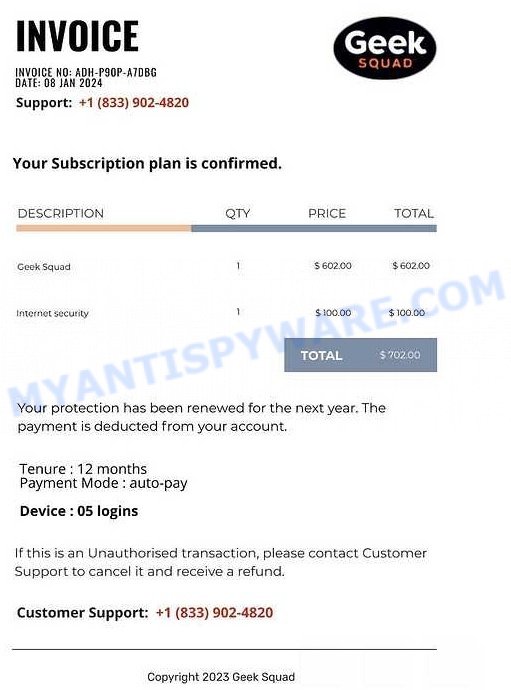
The fraudulent emails are meticulously designed with official-looking logos, a professional format, and familiar language. The scammers use urgency-driven phrases such as “Immediate Action Required” or “Limited Time to Cancel” to pressure victims into dialing the provided phone number without taking the time to verify the email’s legitimacy. Instead of a standard webpage with regular text, recipients are often directed to look no further than the detailed email itself, which appears to leave little room for doubt about its authenticity.
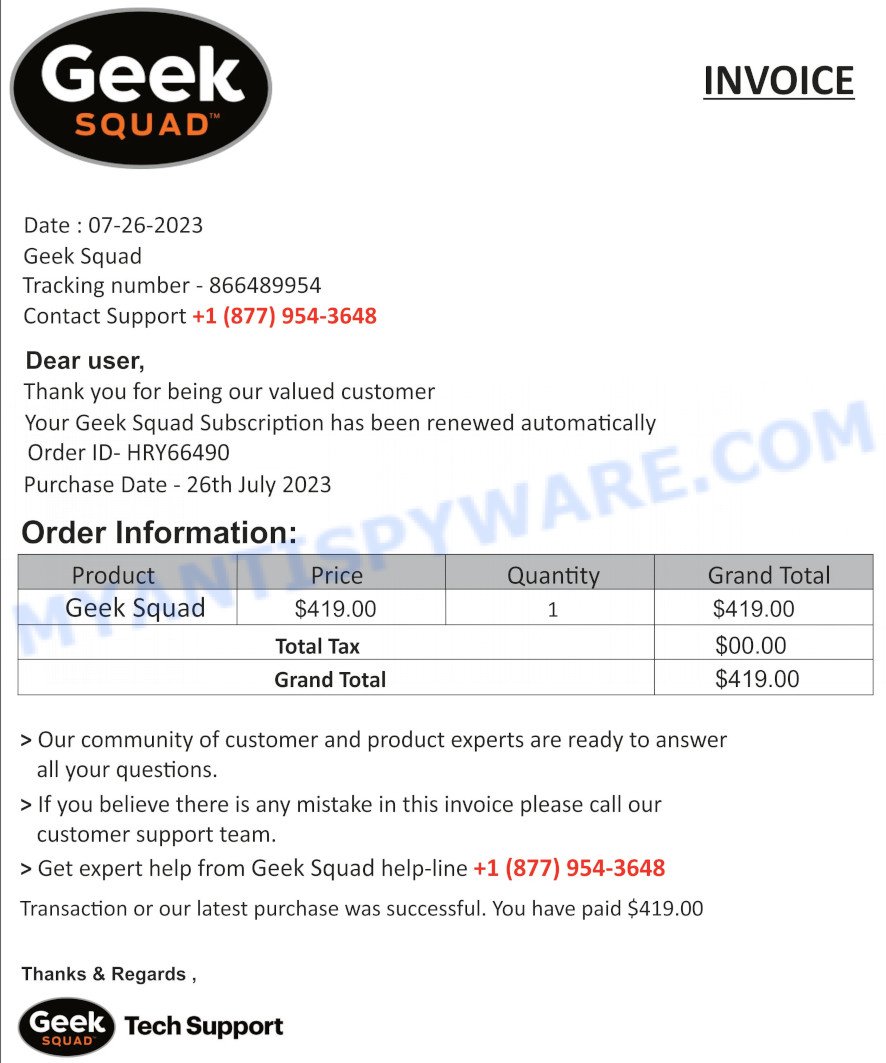
When victims call the number displayed in the email, they are connected to scammers posing as Geek Squad agents. Over the phone, these imposters request personal and financial information—such as full name, address, and bank account details—under the guise of verifying the customer’s identity and securing the pending renewal. The call is presented as an urgent measure to prevent unauthorized charges, making the recipient feel compelled to act quickly without proper scrutiny.
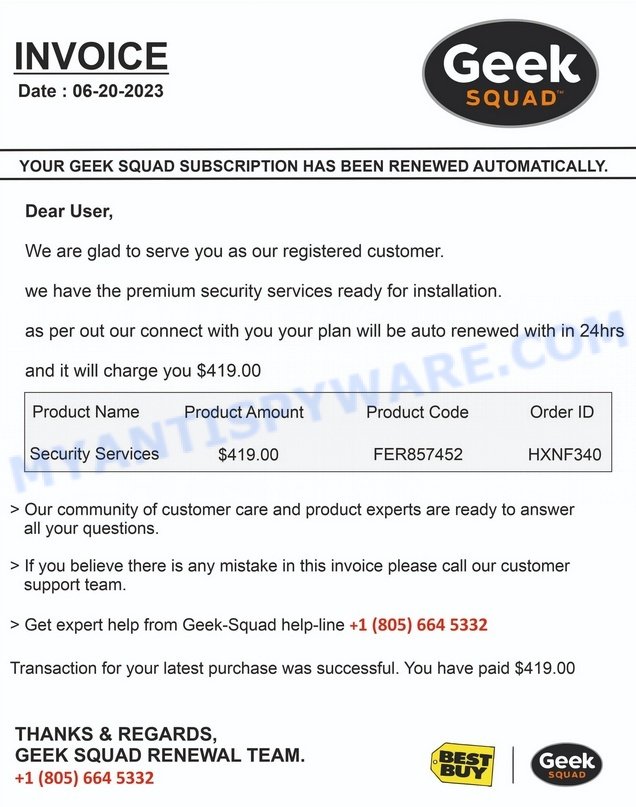
Frequently, these scam communications also include fake assurances like “risk-free cancellation” or “money-back guarantees”, while in reality, any attempts to contact Geek Squad through official channels reveal that the calls and emails are bogus. In many cases, victims later discover that they are subject to unauthorized recurring charges, and attempts to resolve the issue are met with unresponsive or misleading customer service responses.
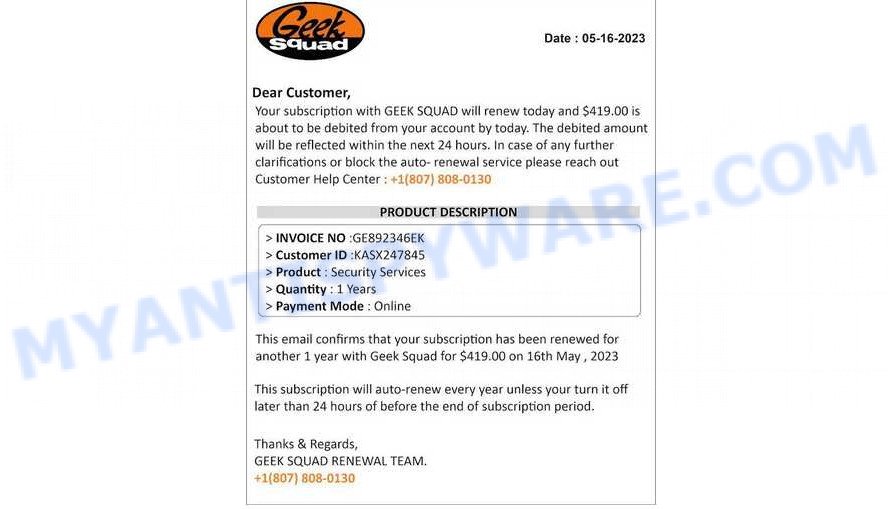
In summary, the Geek Squad Email Scam relies on deceptive email templates, false urgency, and impersonated customer support to trick consumers into divulging sensitive information. Ultimately, this scam leaves many individuals financially harmed and vulnerable to identity theft—all stemming from an email that appears to be from a trusted source.
Examples of such scams
Geek Squad email scam is just one of the many scams that fall under the category of tech support scams. These types of scams involve scammers posing as tech support representatives and tricking victims into giving them remote access to their computers or divulging personal and financial information.
One example of a similar scam is the “Microsoft tech support” scam, where scammers claim to be from Microsoft and tell victims that their computer is infected with a virus. They then offer to help remove the virus, but first require the victim to give them remote access to their computer. Once they have access, they may install malware, steal personal information, or charge the victim for fake services.
- MICROSOFT WINDOWS With Pre-installed Mcafee SCAM
- “Your computer is disabled. Please call Microsoft.” is a SCAM
- “Microsoft Windows Virus Alert” Pop-Up Scam
Another example is the “Apple tech support” scam, where scammers claim to be from Apple and tell victims that their iCloud account has been compromised. They then ask for the victim’s login credentials to fix the issue, which they can then use to steal personal information or perform other fraudulent activities.
- “Apple Security Center” Pop-Up Scam
- Apple Platform Security SCAM
In all of these scams, the goal is the same: to trick victims into divulging personal and financial information that can be used for fraudulent purposes. It’s important to be aware of these types of scams and to always verify the legitimacy of any requests for personal or financial information before giving out any sensitive data.
What to do: If you receive a Geek Squad Scam Email?
If you receive a suspicious email claiming to be from Geek Squad, there are several steps you can take to protect yourself:
- Do not click on any links or download any attachments in the email. These may contain malware or direct you to a phishing website.
- Verify the sender’s email address. Scammers often use email addresses that look similar to legitimate ones but may contain small variations. If you are unsure about the sender, do not respond or provide any personal information.
- Check your account status directly with Geek Squad. Do not rely solely on information provided in the email. Log in to your Geek Squad account or call their customer service to verify any information about your plan.
- Do not provide any personal information over the phone unless you have verified the identity of the caller. Scammers may pose as Geek Squad representatives and try to obtain personal information or payment details.
- Report the email as spam or phishing to your email provider. Report it to the Federal Trade Commission (FTC) at reportfraud.ftc.gov. This can help prevent others from falling victim to the scam.
- If you have already provided personal information or payment details in response to the email, contact your bank or credit card company immediately to cancel any transactions and prevent further unauthorized charges.
- Change your passwords for any accounts associated with the email address you used to sign up for Geek Squad services.
- Consider enabling two-factor authentication for added security on your accounts.
- Stay vigilant and educate yourself about common scams to protect yourself in the future.
- If you have any doubts or concerns about the legitimacy of an email or phone call, don’t hesitate to reach out to a trusted source for advice and assistance.
Threat Summary
| Name | Geek Squad Email Scam |
| Type | Refund Scam, Fake Geek Squad email renewal, Tech Support Scam, Phishing, Social Engineering |
| Email Subject Line | “YOUR INVOICE INFORMATION HAS BEEN PROCESSED. #38496743”, “Services have been automatically renewed!”, “Memebership has been renewed 473442”, “Your Order Receipt From xxx, Check Your Invoice,Thank You”, “Thank you for your order Order No :xxx”, “Transaction confirmation”, “PAYMENT FOR ENABLED PLAN# xxxxx”, “Order Complete” |
| Fake Claims | Geek Squad Subscription has been renewed |
| Scammers’ Phone Numbers | 833 902-4820, 888 864-1605, 888 985-4625, 818 570-5831, 855 470-1138 , 888 864-1538, 877 954-3648, 818 208-2101, 833 469-1619, 805 664-5532, 866 428-2760, 802 402-4333, 833 743-0424, 346 237-9707, 802 755-7226, 762 261-1220, 888 806-9851, 888 722-3440, 833 933-3468, 808 450-3725, 806 275-9514, 912 394-4443, 845 202-9461, 331 258-8503, 417 201-4252, 833 333-3132, 800 620-2913, 888 918-4933, 803 263-9550, 855 857-2244, 888 986-0169, 888 319-1527, 888 296-4945, 866 218-5862, 501 915-1154, 808 909-3013, 888 505-0949, 888 633-9471, 808 272-8244, 808 272-8231, 808 272-8190, 888 407-1253, 808 272-7580, 833 378-0693, 808 272-8101, 808 272-8151, 808 272-8122, 866 616-6642, 808 272-8151, 858 295-7841, 808 272-8114, 808 272-8110, 888 393-1597, 808 272-8573, 704 558-2779, 1 888 970-1499, 1 808 229-3515, 1 833 358-8318, 1 808 229-3484, 1 888 713-7163, 1 808 229-3137, 1 808 229-3329, 1 888 679-1510, 1 888 445-8927, 1 808 210-3177, 1 808 726-2492, 1 888 854-0072, 1 808 229-3034, 1 808 229-2338, 1 808 229-2511, 1 808 229-2544, 1 808 229-2636, 1 808 229-2424, 1 877 640-7022, 1 808 481-4331, 1 808 646-8710, 1 808 515-5060, 1 888 971-9512, 1 818 435-8449, 1 888 359-7648, 1 845 250-0436, 1 903 204-4592, 1 877 762-0736, 1 985 289-0622, 1 877 630-1221, 1 858 252-4002, 1 845 378-5981, 1 808 646-5251, 1 808 657-3062, 1 888 336-4908, 1 877 710-9032, 1 808 646-5584, 1 888 669-7110, 1 888 230-1205, 1 888 416-8608, 1 808 646-5713, 1 808 758-3508, 1 888 988-6905, 1 888 988–6905, 1 808 892-2783, 1 808 646-5151, 1 904 748-9903, 1 888 519-4592, 1 888 603-6413, 1 808 318-2786, 1 888 988-6093, 1 888 988-6093, 1 888-682-2711, 1 805 567-4405, 1 803 263-6654, 1 833 552-7155, 1 845 317-7313, 1 831 607-8702, 1 850 220-1765, 1 831 607-8702, 1 855 352-4466, 1 808 318-8878, 1 808 318-8578, 1 844 272-2299, 1 808 318-2946, 1 540 602-4945, 1 888 339-5318, 1 808 481-4728, 1 845 666-0787, 1 808 318-2357, 1 808 318-8005, 1 888 238-5359, 1 844 232-6022, 1 786 480-6350, 1 888 482-7006, 1 866 748-0439, 1 716 503-1090, 1 877 773-1215, 1 855 263-5265, 1 888 338-7751, 1 866 681-0802, 1 888 413-4825, 1 808 481-4686, 1 803 263-6654, 1 888 273-3449, 1 808 482-501, 1 888 615-3420, 1 808 800-8785, 1 888 674-5540, 1 877 277-7115, 1 888 338 7751, 1 801 833-0348, 1 802 200-7557, 1 844 424-4556, 1 888 521-5255, 1 801 833-0348, 1 888 354-1387, 1 888 616-8191, 1 888 234-7999, 1 808 378-5131, 1 888 594-5828, 1 661 306-7003, 1 808 515-4614, 1 808 437-8454, 1 888 558-0384, 1 808 444-5401, 1 805 386-6133, 1 786 567-5686, 1 833 690 1079, 1 833 690-1079, 1 805 263 4011, 1 888 730-7996, 1 877 417-3092, 1 888 576-9899,1 888 576-9533, 1 888 902-0782, 1 808 649-1120, 1 888 595 0506, 1 808 240-9089, 1 808 649-1454, 1 802 200-3779, 1 802 557-0730, 1 888 210-2786, 1 888 440-0261, 1 808 666-6112, 1 888 899-0155, 1 888 297-0415, 1 818 963-9440, 1 800 306–2981, 1 888 738-8146, 1 844 480-3111, 1 469 297-2928, 1 888 319-1527, 1 888 657-0157, 1 808 825-6575, 1 209 243-5596, 1 806 421-0170, 1 808 649-2677, 1 808 649-2677, 1 856 291-0622 |
| Distribution | Phone, email, website, pop-up ads |
| Target Audience | Anyone who uses electronic devices, particularly seniors and people with limited tech knowledge |
| Prevention Tips | Never give remote access to your device to anyone you don’t know, don’t trust unsolicited calls or pop-ups, use trusted antivirus software, and only download software from official sources. |
| Reporting Info | Report to the FTC at ftc.gov/complaint and to the real Geek Squad team at 1-800-GEEKSQUAD. |
The 22 Latest Geek Squad Scams
Scammers often use the Geek Squad brand to deceive unsuspecting victims into giving away personal information or paying for services that are not actually provided. Below are some examples of fraudulent emails that use the Geek Squad name and logo to trick recipients. It’s important to be aware of these scams and to always verify the authenticity of any email or message before providing any personal information or making a payment.
- Geek Squad Email Scam – July 2023
- Geek Squad Email Scam (May 2023)
- Geek Squad Email Scam #1
- Geek Squad Email Scam #2
- Geek Squad Email Scam #3
- Geek Squad Email Scam #4
- Geek Squad Email Scam #5
- Geek Squad Email Scam #6
- Geek Squad Email Scam #7
- Geek Squad Email Scam #8
- Geek Squad Email Scam #9
- Geek Squad Email Scam #10
- Geek Squad Email Scam #11
- Geek Squad Email Scam #12
- Geek Squad Email Scam #13
- Geek Squad Email Scam #14
- Geek Squad Email Scam #15
- Geek Squad Email Scam #16
- Geek Squad Email Scam #17
- Geek Squad Email Scam #18
Conclusion
The Geek Squad Auto-Renewal Email is a deceptive phishing scheme designed to trick individuals into divulging their personal and financial information. Instead of offering a legitimate computer repair or protection service, the scammers behind this scheme send out fake renewal notifications that closely mimic official communications from Geek Squad/Best Buy. They rely on authentic-looking email templates, complete with logos, customer IDs, invoice numbers, and even fabricated signatures from the “Geek Squad Renewal Team,” all aimed at convincing you that the auto-renewal notice—and the impending charge—is real.
Rather than providing any real benefit, the scam preys on your fear of unexpected charges. The urgent language and detailed account information are used to create a sense of urgency, pressuring you to call a phone number that is, in fact, controlled by fraudsters. Once you call, you risk providing sensitive data such as your name, address, and bank account details, which the scammers can then use to steal your identity, make unauthorized transactions, or even sell your information to other criminal entities.
Bottom Line: Be extremely cautious with any email that claims to be an auto-renewal notice from Geek Squad or Best Buy. Always verify the authenticity of such messages by contacting the company directly using verified contact details—not the ones provided in the suspicious email—and never share your personal or financial information over the phone or via email unless you are absolutely sure of who you are dealing with. If an offer seems too pressing or too good to be true, it’s most likely a scam. Stay vigilant, perform your due diligence, and report any suspicious emails to the proper authorities.
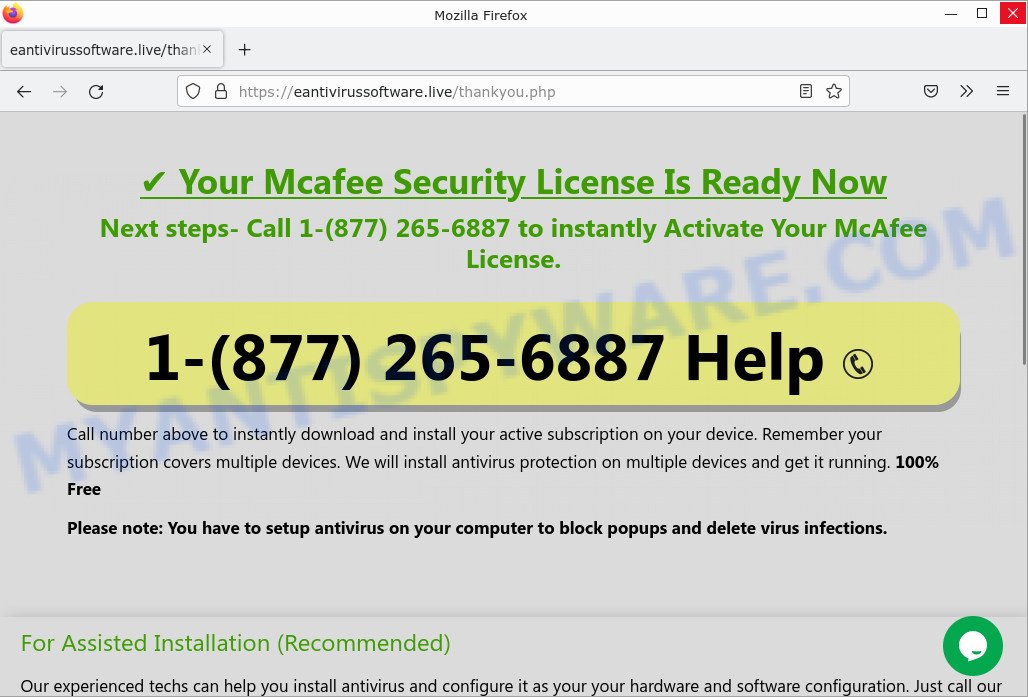
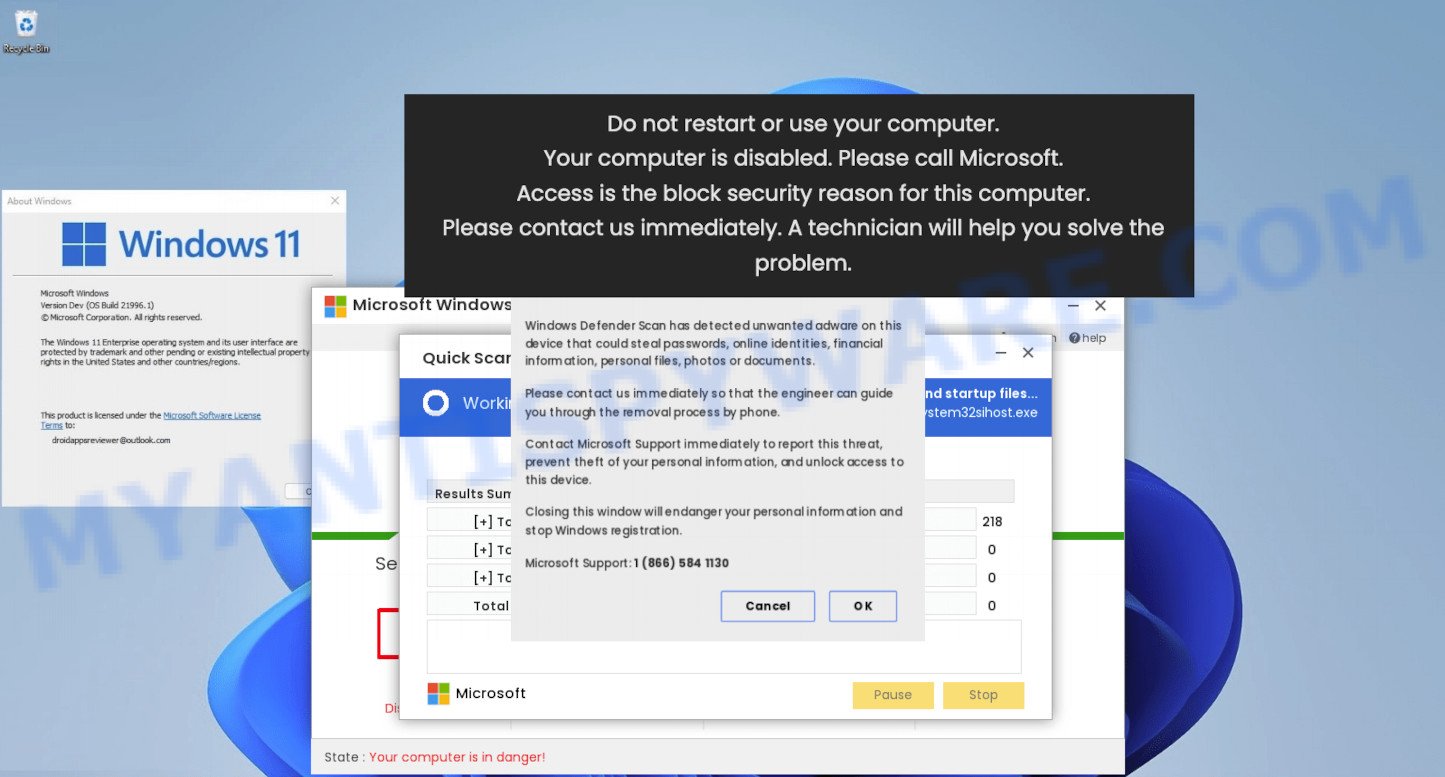
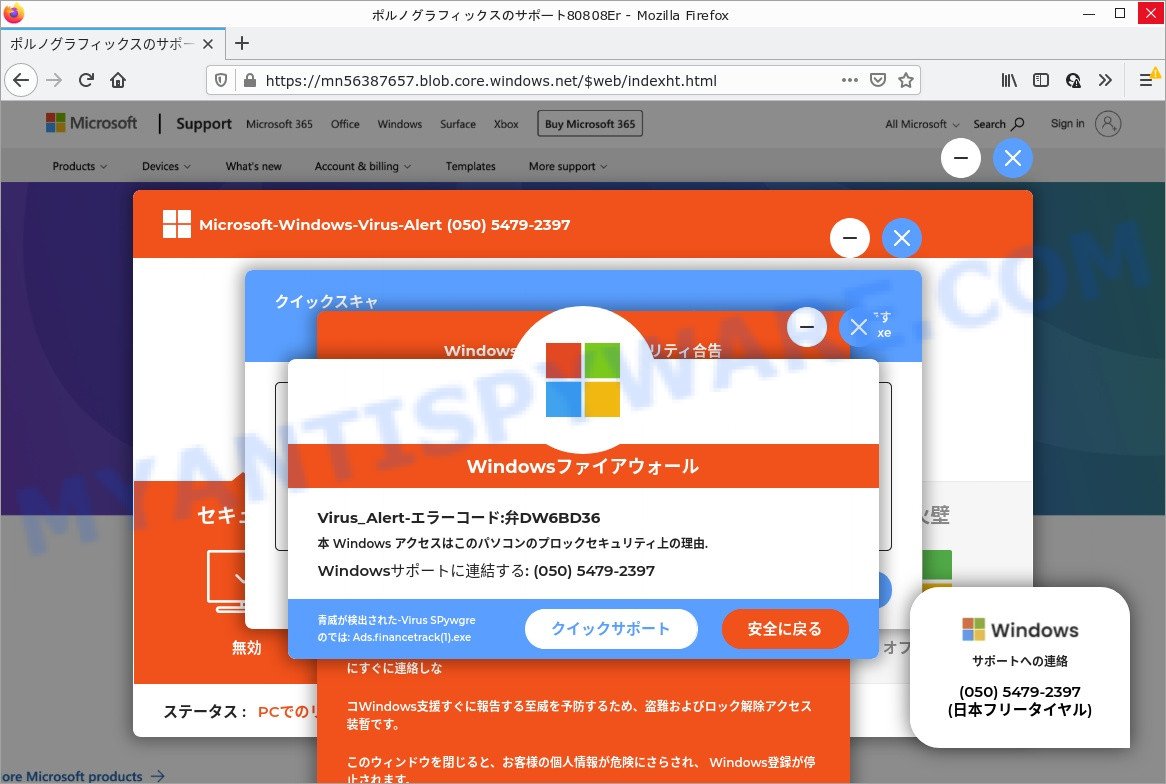
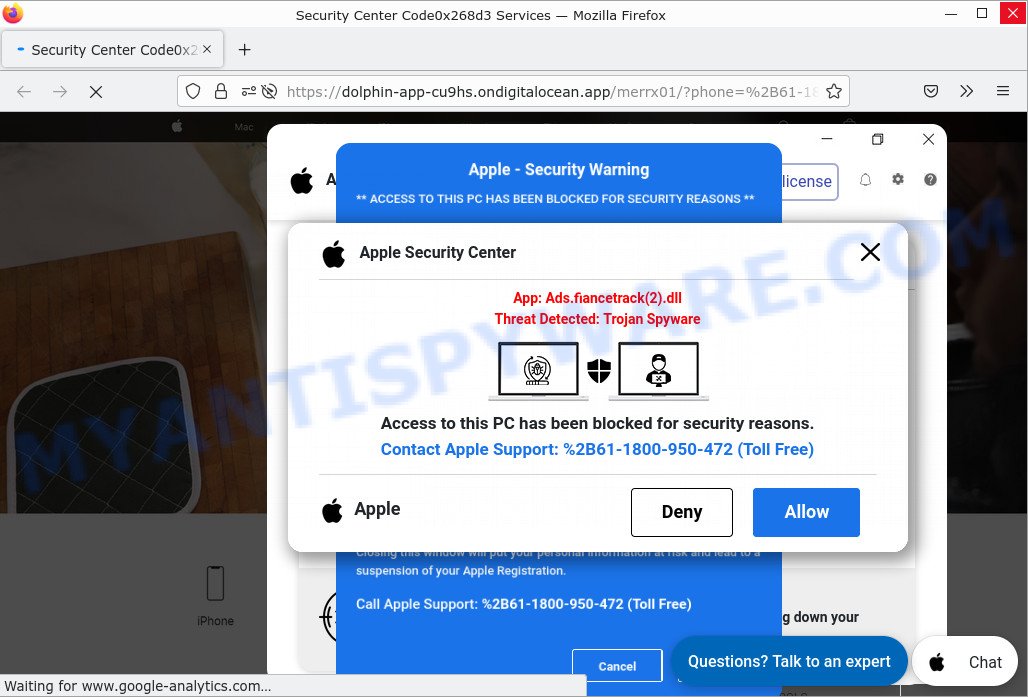
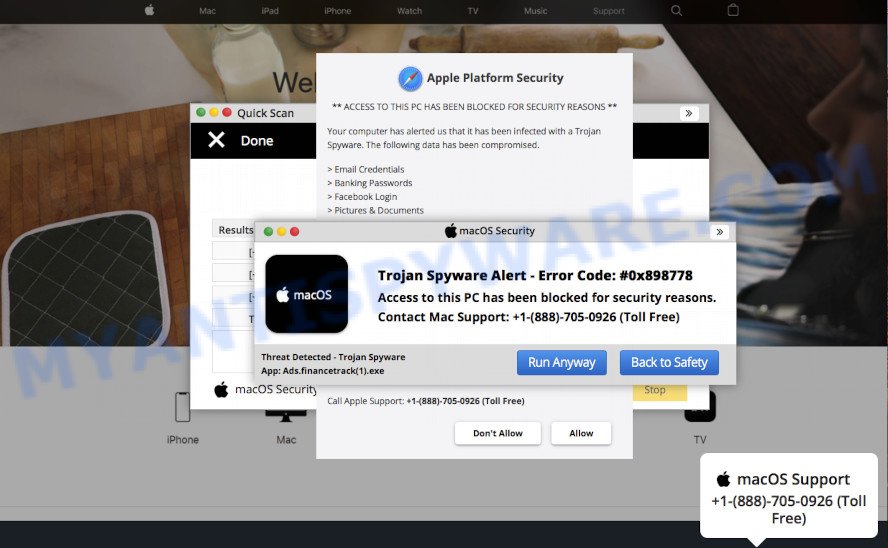
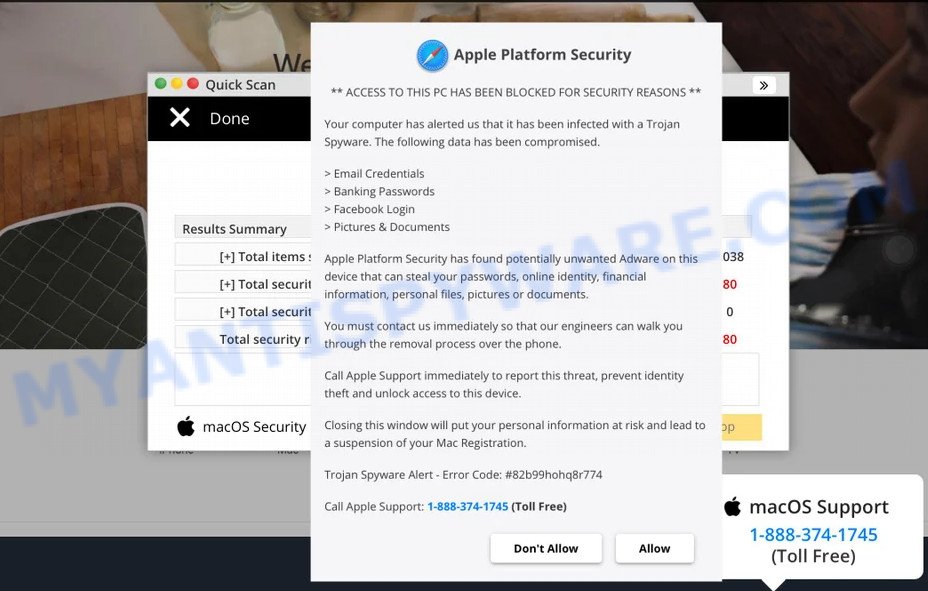
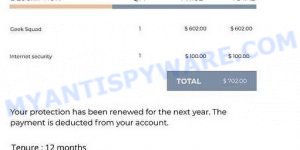
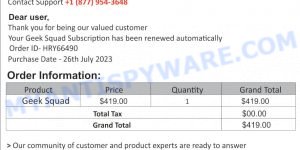
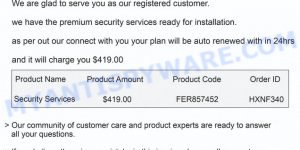
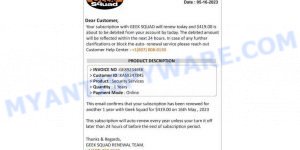
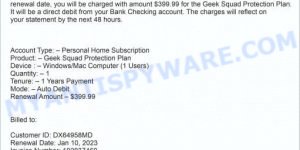
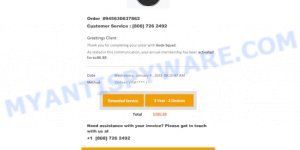
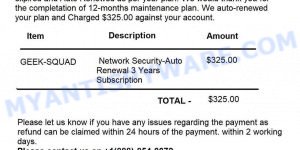
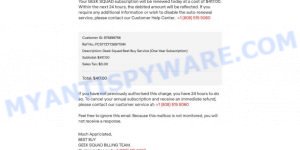
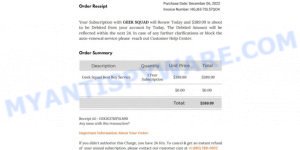
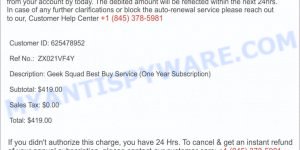
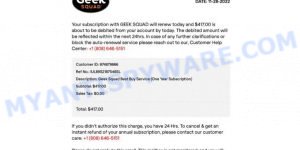
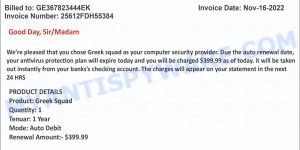


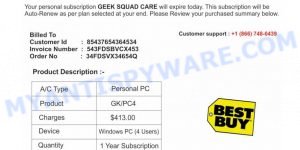
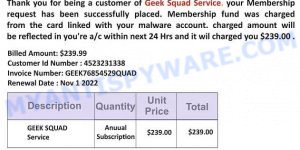
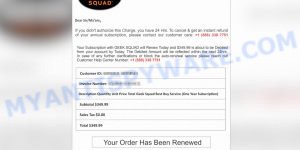
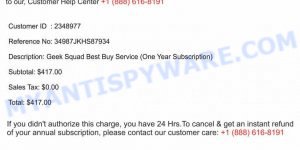

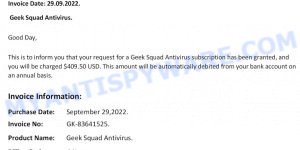
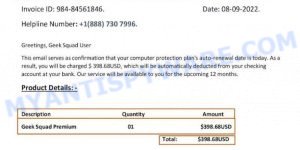
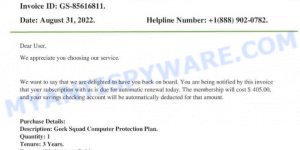
















I received this scam email today
Received today, phone number they listed was 1 808 207 3307, not able to post the image or I would.
Recieved scam with invoice attached today. reporting to reportfraud.ftc.gov…. thanks for all this information. The phone number on the invoice was: 855-926-3265. email from:
Laresbu
I haven’t received this one but I receive 2-4 scam calls a day (blocked by Verizon) mainly from small towns in southern Arizona. We all know no criminals live in small towns.
This scam doesn’t make sense. I’d tell the Geek Squad to go ahead and charge my account since I never had an account with them good luck on charging my account.